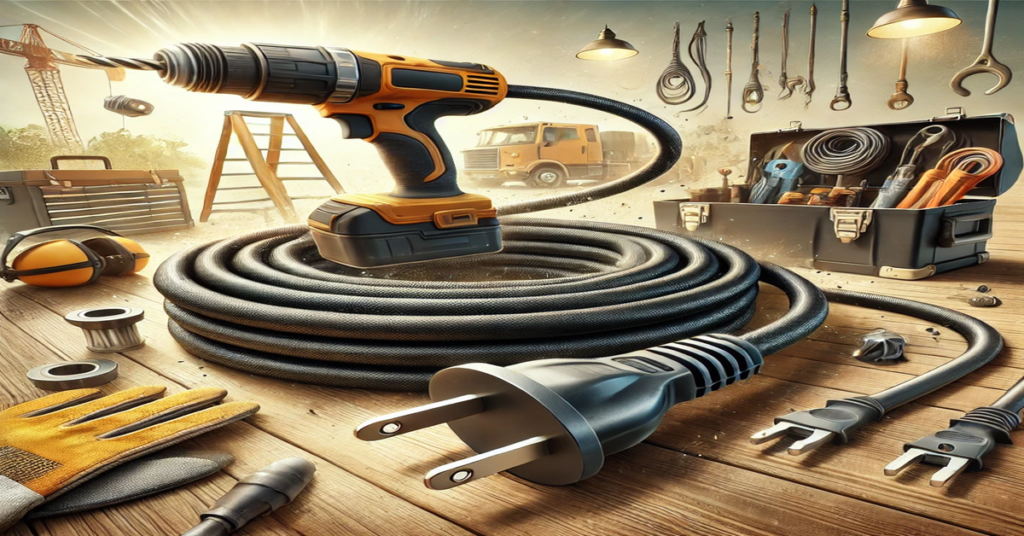In the world of electrical equipment and tools, heavy-duty extension cord stand out as indispensable accessories for both residential and commercial purposes. Whether you’re powering heavy machinery at a construction site, running outdoor appliances, or simply ensuring safety while using electronics, heavy-duty extension cords play a vital role in bridging the gap between power sources and devices.
This comprehensive guide dives deep into what makes heavy-duty extension cords unique, how to select the right one for your needs, safety tips, and maintenance practices to ensure durability. Additionally, we’ll answer some of the most frequently asked questions about these versatile electrical tools.
What Are Heavy Duty Extension Cords?
A heavy-duty extension cord is a robust electrical cable designed to transmit power over greater distances and handle higher electrical loads. Unlike standard extension cords, heavy-duty versions are built with thicker gauges, durable insulation, and advanced safety features to withstand rough usage, extreme temperatures, and environmental factors.
Key Features of Heavy-Duty Extension Cords:
- Gauge Thickness: Heavy-duty cords typically range between 10 to 12 American Wire Gauge (AWG) for higher current capacity.
- Durable Insulation: Made with materials like thermoplastic or rubber to resist abrasion, moisture, and UV rays.
- Amperage Rating: Can handle higher amperage loads (15-20 amps or more).
- Grounding: Most heavy-duty cords come with three-prong plugs for grounding, ensuring user safety.
- Length Variations: Available in lengths ranging from 25 to 100 feet or more, catering to various applications.
Applications of Heavy Duty Extension Cords
Heavy-duty extension cords are highly versatile and can be used in a wide range of applications, including:
1. Construction Sites:
- Powering drills, saws, compressors, and other heavy machinery.
- Handling high-power loads safely in rugged environments.
2. Outdoor Events:
- Lighting, sound systems, and electrical equipment during events like concerts, weddings, or fairs.
- Weather-resistant designs make them ideal for outdoor use.
3. Home Improvement Projects:
- Operating tools like power sanders, lawn mowers, and pressure washers.
- Providing power for appliances in garages or workshops.
4. Emergency Backup Power:
- Connecting generators to essential home or office devices during power outages.
- Ensuring reliable power delivery under high load conditions.
5. RVs and Camping:
- Running electrical devices such as refrigerators, fans, or heaters at campsites.
- Designed to handle outdoor conditions like heat, cold, and moisture.
How to Choose the Right Heavy Duty Extension Cord
Selecting the correct heavy-duty extension cord is essential for safety, efficiency, and longevity. Here’s what to consider:
1. Gauge Thickness
- The lower the gauge number, the thicker the wire and the more power it can handle.
- 16 AWG: Light-duty use (lamps, fans).
- 14 AWG: Medium-duty use (small appliances, indoor tools).
- 10-12 AWG: Heavy-duty use (power tools, large appliances, outdoor use).
2. Amperage and Wattage Capacity
- Ensure the cord’s amperage rating matches or exceeds the device’s requirements.
- To calculate wattage: Multiply the device’s amps by the voltage (e.g., 15 amps x 120 volts = 1800 watts).
3. Length
- Longer cords experience voltage drops, reducing efficiency. Choose the shortest length that meets your needs.
- For longer distances, opt for thicker gauges to minimize power loss.
4. Plug Type and Grounding
- Choose three-prong plugs for grounding to enhance safety.
- Look for polarized plugs to ensure correct current flow.
5. Weather Resistance
- For outdoor use, select cords labeled “W” (weather-resistant).
- Some cords also have “SJ” or “SO” ratings for flexibility in extreme temperatures.
6. UL Certification
- Look for cords certified by Underwriters Laboratories (UL) to ensure they meet safety standards.
Safety Tips for Using Heavy Duty Extension Cords
Improper use of extension cords can lead to electrical hazards such as fires, shocks, or short circuits. Follow these safety tips to use your heavy-duty extension cord responsibly:
1. Inspect Before Use
- Check for frayed wires, cracked insulation, or exposed conductors before plugging in.
2. Avoid Overloading
- Never exceed the cord’s amperage or wattage capacity.
- Use a power strip with surge protection for multiple devices.
3. Keep Connections Dry
- Avoid using cords in wet conditions unless specifically designed for outdoor use.
- Use weatherproof covers for outdoor connections.
4. Uncoil Completely
- Fully extend the cord to prevent overheating from coiled sections.
5. Store Properly
- Avoid kinks and tangles by coiling the cord neatly after use.
- Store in a cool, dry place to prevent damage.
6. Avoid Tripping Hazards
- Keep cords away from walkways, doorways, or high-traffic areas.
- Use cord organizers or cable covers to secure cords.
Maintaining Heavy Duty Extension Cords
Proper maintenance can extend the lifespan of your heavy-duty extension cord and ensure optimal performance. Here are some tips:
1. Clean Regularly
- Wipe the cord with a damp cloth to remove dirt and debris.
- Avoid using harsh chemicals that can degrade the insulation.
2. Check for Damage
- Regularly inspect for wear and tear, especially at the plug and socket ends.
- Replace damaged cords immediately to prevent accidents.
3. Store Properly
- Coil the cord loosely to prevent kinks and breaks.
- Use a cord reel or storage bag for longer cords.
4. Protect from Extreme Temperatures
- Avoid exposing cords to direct sunlight or freezing conditions for prolonged periods.
- Use insulated covers for outdoor storage.
Popular Brands of Heavy Duty Extension Cords
Several manufacturers produce high-quality heavy-duty extension cords. Some popular brands include:
1. Southwire
- Known for durable cords with advanced insulation and flexibility.
2. Iron Forge
- Offers weather-resistant cords ideal for outdoor and industrial use.
3. Woods
- Provides a wide range of cords with UL certification and various lengths.
4. Yellow Jacket
- Specializes in cords with heavy-duty jackets for rugged environments.
5. Amazon Basics
- Delivers affordable yet reliable cords for general-purpose use.
Benefits of Heavy Duty Extension Cords
Using a heavy-duty extension cord offers several advantages:
1. Versatility
- Compatible with a variety of devices, from power tools to home appliances.
2. Durability
- Designed to withstand tough conditions, including rough handling and outdoor environments.
3. Enhanced Safety
- Equipped with grounding and weather-resistant features to reduce the risk of electrical hazards.
4. Increased Efficiency
- Minimizes voltage drops over long distances, ensuring devices receive consistent power.
5. Cost-Effective
- Long-lasting and reliable, reducing the need for frequent replacements.
Conclusion
Heavy-duty extension cords are essential tools for powering equipment, ensuring safety, and providing convenience across a wide range of applications. By understanding their features, choosing the right cord for your needs, and following safety and maintenance guidelines, you can maximize their effectiveness and longevity.
Whether you’re a DIY enthusiast, a professional contractor, or simply need reliable power solutions for outdoor activities, a high-quality heavy-duty extension cord is a worthy investment. Prioritize safety and performance, and you’ll have a tool you can depend on for years to come.
FAQs About Heavy Duty Extension Cords
1. What gauge is best for a heavy-duty extension cord? For heavy-duty use, a 10-12 AWG cord is recommended as it can handle higher amperage and power larger devices.
2. Can I use a heavy-duty extension cord outdoors? Yes, as long as it is labeled weather-resistant (“W”) and designed for outdoor use.
3. How long can a heavy-duty extension cord be? Heavy-duty cords are available in lengths up to 100 feet or more. For longer distances, choose a lower gauge to minimize voltage drops.
4. Are heavy-duty extension cords safe for indoor use? Yes, they are safe for indoor use, provided they are not overloaded or used near wet areas.
5. How do I maintain a heavy-duty extension cord? Regularly inspect for damage, clean with a damp cloth, and store in a cool, dry place to extend its lifespan.
6. Can I connect multiple heavy-duty extension cords together? While possible, it’s not recommended due to increased resistance and potential voltage drops. Use a single cord of the required length instead.







